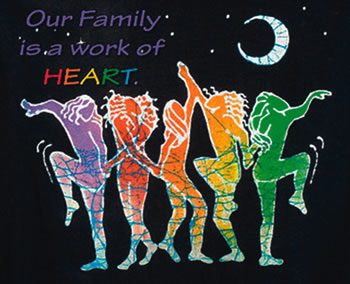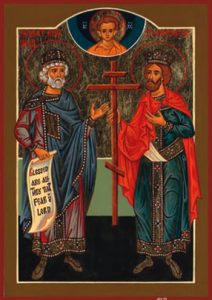Marriage Forever – Part II
Contemplating The Truth About Marriage For Life
In the light of the recent Synod about Pastoral Challenges to the Family in the context of Evangelisation, it is good for all of us to reflect on married peoples’ call to mission and holiness and how that fits into the big picture of Catholic faith life. The Synod is looking at the complexity of post-modern life and how that impacts on Catholic marriage and family life. This complexity which is ‘of the world’ is part of progressive life and the problems it causes human beings. It is right and just that this complexity be addressed. But if there is a love at the heart of the Gospel which is ‘in the world but not of the world’, that love and the difficulty human beings have living it, needs thinking about too.
The struggle feminine love has to put down roots in marriage and family life is not particularly a post-modern problem. It has more to do with the age-old battle love has in conquering pride. Perhaps the Synod will tell us how to address our pride but in the meantime we all need to contemplate our Christian love. We need to find in the Gospel the seeds of that love, plant them and nurture them. In contemplating his death and Resurrection Jesus speaks of the grain of wheat that must fall to the ground and die in order to bear fruit. Our love must be like this, ever dying to itself in order to give life to something greater and more powerful. If we plant these sorts of gospel seeds in our sacramental lives our love bears plenty of fruit. Some sort of spiritual seed-raising beds are needed so that we may get these plantings underway and the inner life of the Church must provide them because the world cannot.
The essence of feminine love is self-sacrifice. In this sacrifice it is joined to Christ on his Cross. It can be lived equally well by men and women. The most universal place where feminine love is lived is the home. The most common way we live it is by conquering our ego desires, rising above ourselves to be kind when we want to be unkind, be generous when we want to get even. Simply trying hard to be good in all those venial, everyday occasions when our ego-pride threatens harmony in the home, we are living feminine love.
As with anything feminine there is an element of mystery about this sort of love. It seems to work without us really knowing why. But mystery can be jolly frustrating at times and marriage between a man and a woman is a good place to live out the frustration that mystery causes, not to conquer it or master it but simply to love it as a normal part of human love relationships.
Our Bishops have put out a pastoral and my local Bishop has added to that a letter of his own in which he says, “The complexity of human nature and of the circumstances in which we can find ourselves, set against the ideals rightly treasured of marriage and family life, present us all with a conundrum or a mystery. How can we pursue and uphold the ideal (lifelong marriage) yet accept and include those in situations at variance with that?”
The bishops in their pastoral care of all married people suffer the mystery of this question and we must consider their burden and keep them in our prayers. They are amongst the blessed who mourn and they shall be comforted. The laity are not called to suffer the mystery of Church teaching in the same way as the Bishops. We are asked through our marriage vows to live the mystery. In doing so we will encounter the mystery of God’s life on earth, which is simply the painful process of God’s love becoming part of our human love. That will bring some suffering of a spiritual nature into our lives because human love is tainted with pride and in the Gospel we do not read about pride getting the better of Jesus Christ’s love.
If human nature is complex, Catholic marriage is doubly so. In marriage we have two individuals, one male one female trying to live something of God’s life on earth, each trying to be individually holy, each feeding their holiness into a spousal love. In every marriage each spouse is probably at a different stage of their faith journey. Some individuals may have no faith journey, or be of a different faith. Some may not even believe in God, but Catholic marriage vows involve both spouses. And so we have two spouses trying to live the Church teaching on marriage as one couple. If we bring children into marriage we have two parents trying to bring up children with a father’s love and a mother’s love. It is a mystery that Catholic marriage works at all.
The Pope says that there is no such thing as the ideal marriage and the laity are beginning to discover after fifty years of back-breaking work that there is no such thing as the ideal lay community. The more we try as Christians to create ideal marriages or ideal communities the less free we are to simply live the mystery of Catholic sacramental life. When it comes to living this mystery we more often than not need spiritual guidance from priesthood. Without this we tend to go our own ways becoming divided, interpreting the Gospel in a way that suits our rather proud attempts at growing Christian love.
Married family life is a small Christian community. It is a seedbed of love. This small holy family functions away from the public eye, from the goings on and public image of worldly success that larger Christian communities consider important. Being away from the public eye does not mean marriage and family life are consigned to the sphere of private life. Hidden life is not private life just as a baby’s life in the womb is hidden but not private. Indeed if this small community plants and nurtures feminine love as it should, that love spills over giving birth to parish life and a worshipping community comes into being. Mysteriously this seedbed of love, (what we once called the domestic church), both gives life to and receives life from this worshipping community.
Small holy families can do ordinary spiritual work that larger Christian communities cannot do no matter how hard they try. One of the things that married family life can do better than bigger lay Christian communities is accept human pride as a normal part of human relations and deal with its tendency to hurt and divide members from one another. Where people all live under the same roof and sit down around the same table to eat, the unity of the family becomes paramount. Where the heart of unity is desired above all else, love prevails over pride and unity is given life. This life which the Pope says is “real life” has the heartiness and mysterious workings of Trinitarian harmony. It may not have its absolute perfection but in conquering pride it has enough grace and favour to work fruitfully enough.
Pride hates a mystery. Pride loves to reign where feminine love is forsaken for more worldly sorts of love. The ideas about marriage and family life that waft around in popular culture are mystery and suffering free. These popular ideas have become markedly different from the sacramental ideal of marriage and family life that the Church teaches and asks the laity to hold dear. The Church does not set that ideal in concrete, in an ideal community or an ideal marriage but in the everyday life of Jesus Christ in the sacraments and the mysterious idea that we can meet him therein and live with him therein even though we are sinners.
We can start living the mystery of marriage for life now. It is generally accepted that terrifically active pastoral life of the last fifty odd years needs to pause and take stock. In this pause we all need to be a bit more contemplative. We need to think about our Christian love, our little seedbeds of love, and remember God. Strictly speaking, one cannot remember God, but the psalmist did and in his pain his heart melted within him. This sort of remembering is more primitive and holy than simply harking back to the good old days or to the so-called ghetto. It is, dare I say it, a survival action for sacramental life.
There is no danger that in this pause we will become a Church of contemplatives. Those who love God in people will always outnumber those who love people in God. There is more likely to be a good chance that our messy, everyday sacramental lives will be witnessed by the world as different because they are always moving towards God who is Love. There is a good chance that those witnessing our happy, suffering lives will, through the grace of God and the power of the Holy Spirit, remember God too, in their own hidden ways and in the fullness of time.




 Entries(RSS)
Entries(RSS)